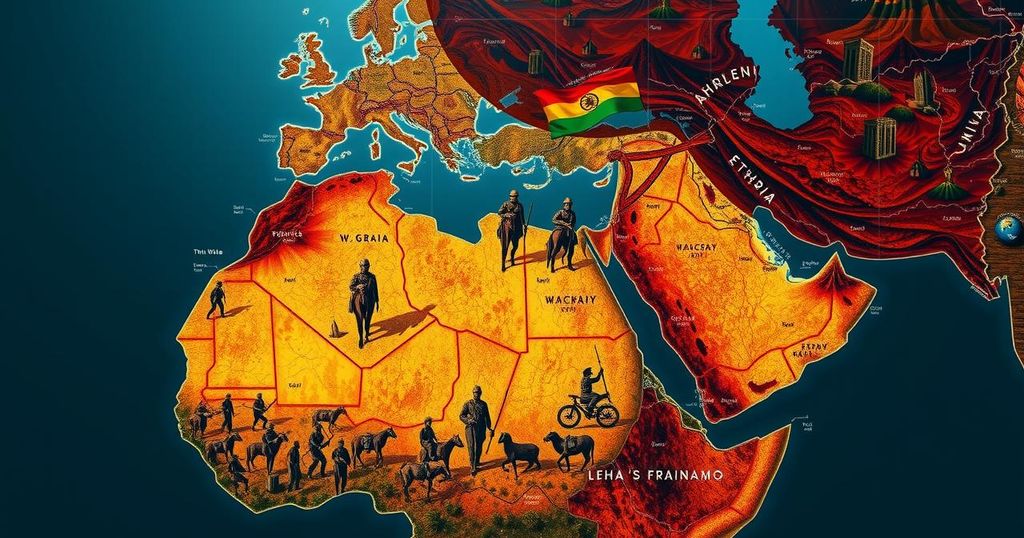In October, the leaders of Egypt, Eritrea, and Somalia convened a summit in Asmara, focusing on military cooperation amidst growing tensions with Ethiopia over the Grand Ethiopian Renaissance Dam (GERD) and the Entebbe Agreement affecting Nile water management. Egypt’s strategic alliances aim to counter Ethiopia’s influence and secure its water rights, while navigating a changing political landscape in the Horn of Africa. Experts suggest these developments may indicate a shift towards more militaristic foreign policy measures as Egypt seeks to rally regional support.
In early October, a significant trilateral summit convened in Asmara, where the leaders of Egypt, Eritrea, and Somalia gathered to reaffirm their commitment to regional cooperation, particularly in military assistance for Somalia’s counterterrorism initiatives. The summit underscored Egypt’s concerns regarding Ethiopia’s expanding influence in the region, particularly following Ethiopia’s recent agreement with Somaliland aimed at establishing a military base along the coast. This development is perceived as exacerbating the long-running dispute between Egypt and Ethiopia regarding the Grand Ethiopian Renaissance Dam (GERD), which Egypt views as a direct threat to its national security. Additionally, recent activation of the Entebbe Agreement—a pivotal accord for Nile river water management—has raised alarms in both Egypt and Sudan, who regard it as a significant risk to their water supplies. The Asmara summit appears to be part of Egypt’s broader strategy to reestablish its partnerships within Africa through heightened diplomatic and military relations with neighboring countries, as noted by Iman Abdel Azim, a political scientist at Cairo University. Since 2019, Egyptian authorities have increasingly emphasized the strengthening of ties with African nations, reflecting a growing military presence in the region. This military posture has been exemplified by Egypt’s recent agreements with Somalia and Eritrea over joint defense, as well as military exchanges. Experts suggest such moves signal a shift toward a more militarized and security-focused foreign policy. Ethiopia’s construction of the GERD and its diplomatic maneuvers within the Nile Basin, particularly its influence over South Sudan following the ratification of the Entebbe Agreement, has compelled Egypt to reconsider its alliances. Abbas Sharaky, a professor of water resources, emphasized the detrimental effects of the dam on Egypt’s water supply, indicating that the storage in the GERD directly undermines Egypt’s water allocation. Despite attempts at negotiations regarding Nile waters, the Egyptian government finds itself confronted with a dire water crisis, exacerbated by Ethiopia’s actions. Furthermore, the decline of Egypt’s historical influence in Africa, particularly since the era of President Gamal Abdel Nasser who championed African unity, has allowed Ethiopia to strengthen its position in the region. Current tensions reveal a complex geopolitical landscape, with Egypt forging alliances with nations such as Eritrea and Somalia to counter the Ethiopian threat. The ongoing situation reflects a strategic endeavor to engineer a coalition capable of addressing the challenges posed by Ethiopia’s maneuvers, particularly concerning the GERD and water rights negotiations, while also responding to internal pressures within Egypt stemming from threats to its water security.
The ongoing disputes between Egypt and Ethiopia stem from competing interests over the Nile River, particularly regarding the construction and operational management of the Grand Ethiopian Renaissance Dam (GERD). The GERD has been a central issue in bilateral relations for nearly a decade, with Egypt fearing significant reductions in its water supply as a result of Ethiopia’s dam operations. Furthermore, the geopolitical dynamics in the Horn of Africa have become even more complex in light of recent diplomatic engagements, including Ethiopia’s military agreements and recognition of Somaliland. As Egypt seeks to bolster its influence and secure its water rights, its military alliances with Eritrea and Somalia serve as strategic responses to perceived threats from Ethiopian policies. Additionally, historical factors contribute to the current tensions, as Egypt has experienced a gradual decline in its political influence in Africa since the mid-20th century, impacting its ability to maintain regional partnerships critical to its national security interests. This historical backdrop is crucial for understanding the motivations behind Egypt’s recent military collaborations and diplomatic overtures.
In conclusion, the recent expressions of military cooperation among Egypt, Eritrea, and Somalia signal a significant shift in regional alliances shaped by Egypt’s efforts to counterbalance Ethiopia’s growing influence, particularly regarding the GERD and water resource management. The evolving dynamics in the Horn of Africa demonstrate Egypt’s commitment to establishing a coalition with neighboring countries as a means of navigating complex geopolitical challenges. As pressures mount, the interplay between historical relationships and contemporary diplomatic maneuvers will be pivotal in determining the future of Egypt’s engagement in Africa and its pursuit of regional stability.
Original Source: www.newarab.com






